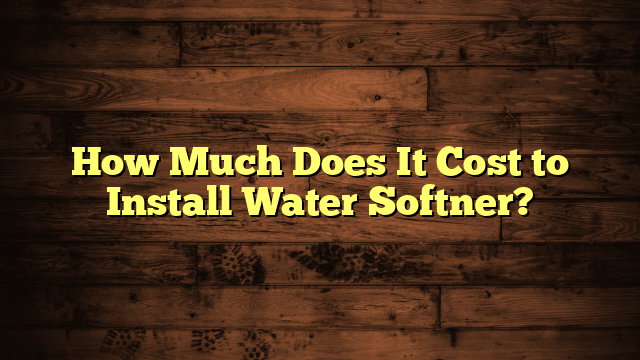How Much Does It Cost to Install Water Softner?
You might think installing a water softener is too expensive for your budget, but the truth is, costs can vary greatly based on several factors. From the type of system you choose to your household's specific needs, these elements can greatly influence the overall expense. Understanding the average purchase prices and installation costs can help you make an informed decision. Plus, there are ongoing maintenance fees and potential savings to take into account. So, what does it really take to get started?
Key Takeaways
- Installation costs for water softeners range from $100 to $300, depending on complexity and location.
- Purchase prices vary from $400 to $4,000 based on system type and features.
- Small units for low water usage typically cost between $400 and $800, while larger systems are priced from $1,000 to $4,000.
- DIY installation can reduce costs significantly, but professional installation ensures proper setup.
- Additional expenses like plumbing supplies and potential permits can add $50 to several hundred dollars to the total cost.
Understanding Water Softener Types
When it comes to choosing a water softener, understanding the different types available can make a big difference in your decision. The most common type is the ion exchange water softener, which works by replacing hard minerals like calcium and magnesium with sodium ions. This method effectively reduces scale buildup in your plumbing, appliances, and fixtures.
If you're looking for a more eco-friendly option, consider a salt-free water softener. These systems use a process called template-assisted crystallization to prevent scale formation without the use of salt. While they don't technically soften water in the traditional sense, they can still help protect your plumbing and appliances from mineral buildup.
When choosing between ion exchange and salt-free systems, think about your specific water quality needs and preferences. Ion exchange systems typically require regular maintenance, including salt replenishment, while salt-free systems are often low-maintenance.
Keep in mind that your decision will also impact how you feel about your water's taste and how well it interacts with soap and detergents. Understanding these types will help you make an informed choice, ensuring you select the best solution for your household.
Average Purchase Prices
The cost of purchasing a water softener varies considerably based on the type and features you choose. Generally, you can expect to pay between $400 and $4,000 for a unit, depending on system size and water quality needs.
Smaller units designed for apartments or homes with low water usage tend to be more affordable, often starting around $400 to $800. If you have a large household or high water consumption, you'll likely need a larger system, which can range from $1,000 to $4,000.
In addition to system size, the features you select also influence the price. For instance, a basic ion-exchange system might be on the lower end of the price scale, while advanced options, like dual-tank systems or those with smart technology, can drive costs higher.
Keep in mind that higher-quality systems often provide better efficiency and longer lifespans, which can save you money in the long run. Ultimately, it's important to assess your specific water quality and household needs to find the right balance between price and performance.
Investing in a suitable water softener can lead to significant improvements in your home's water quality.
Installation Costs Breakdown
Installing a water softener involves various costs that can greatly impact your overall budget. First, you'll need to evaluate the installation process itself. Depending on your home's plumbing setup, this can vary considerably.
If you're opting for a professional installation, labor costs typically range from $100 to $300, depending on the complexity of the job and your local rates.
Additionally, if you're handy, you might choose to tackle the installation yourself to save on labor costs. This could reduce your expenses, but remember, it's vital to understand the process fully to avoid any costly mistakes.
You should also factor in any necessary permits or inspections, which can add to your overall expenses. Some areas may require a permit for water softener installation, and these fees can vary.
Lastly, don't forget to include any additional supplies you might need, such as plumbing fittings or connectors, which can add a few extra dollars to your total cost.
Additional Equipment Expenses
While considering the overall cost of installing a water softener, it's vital to account for additional equipment expenses that may arise. One significant expense is the brine tank, which is essential for the softening process. This tank holds the salt used to regenerate the resin beads that soften your water. Depending on the model and size, brine tanks can cost anywhere from $100 to $500.
You'll also need to think about installation accessories, which can add to your overall budget. These accessories might include pipes, fittings, and valves necessary for a proper installation. Depending on your home's plumbing setup, these items can range from $50 to several hundred dollars.
Don't forget about potential labor costs if you're hiring a professional for installation. Even if you're a DIY enthusiast, having the right tools and equipment can make the job easier.
Ongoing Maintenance Fees
Ongoing maintenance fees for a water softener can add up over time, and it's crucial to factor these into your budget.
While investing in a water softener can greatly enhance your water quality, understanding the costs involved in its upkeep guarantees you're prepared for the long haul.
Here are some typical ongoing maintenance expenses you should consider:
- Salt Replenishment: You'll need to purchase salt regularly to keep your system functioning effectively, which can range from $5 to $20 per month.
- Filter Replacement: Depending on your system, you might need to replace filters every 6 to 12 months, typically costing between $30 and $100.
- Regular Maintenance Checks: Scheduling a professional inspection once a year can help catch issues early. Expect to pay around $75 to $150 for this service.
- Water Testing: Periodic testing confirms your system is working properly; this may cost $20 to $50.
- Repairs: Occasional repairs are necessary, and costs can vary widely based on the issue.
DIY Vs Professional Installation
When considering the total cost of a water softener, installation methods play a significant role in your budget. You have two primary options: DIY installation or hiring a professional. Each choice has its benefits and drawbacks, making a cost comparison essential for your decision.
If you're handy, taking the DIY route might save you money. Basic installation kits can be found at home improvement stores, and many come with detailed instructions. However, keep in mind that errors during installation can lead to costly repairs down the line.
Plus, you'll need to factor in the time and effort you'll invest.
On the other hand, professional installation guarantees that everything's done right the first time. While this option is typically more expensive, it can provide peace of mind, especially if you're unfamiliar with plumbing.
Professionals can also handle any complications that may arise, which can save you stress.
Ultimately, your choice depends on your skills, budget, and willingness to tackle the project. Carefully weighing these installation methods will help you make an informed decision, guaranteeing you get the best value for your investment.
Factors Influencing Total Cost
Understanding the factors influencing the total cost of a water softener is crucial for making an informed purchase. Several elements contribute to the final price tag, and knowing what to look for can help you choose wisely.
- System Types: Different systems, such as ion exchange, salt-free, and reverse osmosis, come with varying price ranges and installation costs.
- Capacity Considerations: Larger households may require a system with a higher capacity, which typically costs more upfront but can be more efficient in the long run.
- Installation Complexity: If your home requires extensive plumbing or electrical work, expect an increase in installation costs.
- Brand Reputation: Well-known brands often charge more, but they might offer better warranties and customer support.
- Additional Features: Systems with advanced features, like digital controls or smart technology, usually come with a higher price.
Long-term Savings Considerations
Investing in a water softener can lead to significant long-term savings that often outweigh the initial installation costs. When you consider the long-term benefits, it becomes clear that a water softener can save you money on various home expenses.
Hard water can damage appliances, leading to costly repairs or replacements. By softening your water, you extend the lifespan of your dishwasher, washing machine, and water heater, which translates to lower replacement costs over time.
Additionally, softer water requires less detergent for laundry and dishwashing, resulting in savings on cleaning products. You'll also notice reduced energy bills, as softened water allows appliances to run more efficiently.
When you do a cost comparison between the expenses of maintaining hard water and the investment in a water softener, the savings become evident. In most cases, the small upfront cost of installation is quickly recovered through reduced utility bills and extended appliance lifespans.
Ultimately, choosing to install a water softener isn't just about immediate comfort; it's a smart financial decision for your home's future.
Frequently Asked Questions
What Are the Signs That I Need a Water Softener?
You'll notice hard water indicators like dry skin, dull hair, and soap scum. Look for mineral buildup signs on faucets and appliances. If these issues arise, consider getting a water softener to improve your water quality.
How Do I Choose the Right Size Water Softener?
To choose the right size water softener, assess your water hardness and determine your household's daily water usage. Match these figures with the system capacity to guarantee effective softening without wasting resources.
Can a Water Softener Affect My Plumbing?
Yes, a water softener can affect your plumbing. Proper plumbing maintenance guarantees that softened water improves water quality, preventing scale buildup and extending the life of your pipes and appliances. Choose wisely for best results.
What Is the Lifespan of a Typical Water Softener?
Did you know a well-maintained water softener can last up to 15 years? To maximize lifespan, keep up with maintenance tips and consider replacement frequency to guarantee your system runs efficiently throughout its life.
Are There Any Health Risks Associated With Softened Water?
You might have health concerns about softened water, but it typically poses minimal risks. Soft water benefits include improved skin and hair health, while the sodium content is often negligible for most individuals. Stay informed and consult a doctor.
Conclusion
In summary, investing in a water softener can transform your home's water quality from harsh and gritty to smooth and revitalizing. While the initial costs might seem steep, consider the long-term benefits of better appliances and softer skin. Balancing the upfront expenses with ongoing savings paints a clearer picture of value. By weighing your options, whether DIY or professional, you're taking an essential step toward enjoying cleaner, softer water for years to come.







